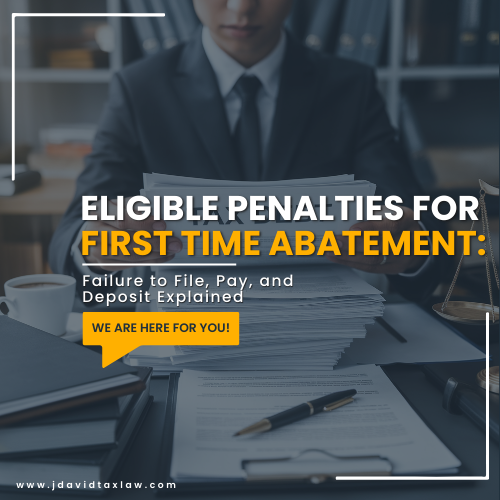For Tampa taxpayers struggling with significant tax debts, finding a feasible solution is a priority. The IRS Offer in Compromise (OIC) program presents a potential lifeline and resolution to settle unpaid taxes. This program allows qualified individuals and businesses to pay for their tax liabilities for less than the full amount owed. It offers a fresh start to those overwhelmed by their financial obligations to the federal government.
The OIC is particularly relevant in Tampa, where economic fluctuations can impact residents’ ability to meet their tax responsibilities. By understanding the OIC process, Tampa taxpayers can effectively manage their debts and potentially avoid the severe consequences of prolonged IRS issues.
J. David Tax Law in Tampa can help you apply for an Offer in Compromise. Getting the services of tax lawyers from this firm will give you the edge in maintaining compliance with the IRS. Get your free initial consultation today to learn more about the OIC process and resolve your tax debt in no time.
What is an Offer in Compromise?
An Offer in Compromise (OIC) is a program from the IRS that allows taxpayers to settle their tax debts for less than the full amount owed. This agreement is based on the understanding that the offered amount is the most the IRS can expect to collect within a reasonable time frame.
The primary purpose of the OIC program is to enable taxpayers with significant tax liabilities and financial difficulties to resolve their debts. It helps prevent enduring financial hardships while allowing the IRS to collect a portion of the owed taxes. It facilitates a compromise that benefits both the taxpayer and the government.
Eligibility Criteria
To qualify for an OIC, applicants must meet certain qualifications set by the IRS:
All filing requirements must be up to date.
All required estimated payments for the current year must be made.
Individuals must not be in an open bankruptcy proceeding.
The IRS uses financial assessments to determine a taxpayer’s ability to pay. This includes a thorough evaluation of the following:
Taxpayer’s income;
Expenses;
Asset equity, and
Overall financial situation.
It also calculates the Reasonable Collection Potential (RCP) of the taxpayer applying for an OIC. This will include the value that can be realized from the taxpayer’s assets, such as real property, automobiles, bank accounts, and future income.
3 Types of Offers in Compromise
The IRS recognizes that there are varying circumstances under which taxpayers may struggle with tax liabilities. It offers different types of Offers in Compromise to address these specific situations.
Weighing the benefits of each option can help determine the most appropriate pathway for resolving tax debts. Ideally, it must be based on the taxpayer’s unique financial condition and the reasons behind their inability to pay the full amount.
Doubt as to Collectibility
This type of OIC is proposed when the taxpayer’s assets and income are less than the total amount of the tax liability owed. It indicates that the tax debt is unlikely to be fully collectible.
Doubt as to Collectibility is the most common form of OIC. This is applicable when the IRS agrees that the taxpayer’s situation would not allow them to fully pay their debt. It also considers the timeframe and date of when the payments are due.
Doubt as to Liability
This offer is appropriate when there is a genuine dispute about the existence or amount of the correct tax debt under the law. It might occur if there were errors in the original determination of the tax owed.
It may also be an option if new evidence or changes in the law affect the amount of tax liability. Taxpayers opting for this type of OIC do not necessarily have to demonstrate financial hardship.
Effective Tax Administration
This OIC may be accepted if collecting the full amount of tax would create an economic hardship, be unfair, or be inequitable. This must be due to exceptional circumstances that do not fit the other two categories.
The Effective Tax Administration is a less common option for individuals and business owners in Tampa. However, this is still applicable for cases where paying the full tax debt would be destructive to a taxpayer’s ability to meet basic living expenses. Even those instances that may constitute an exceptional circumstance that the IRS believes warrants relief.
The Application Process for Offers in Compromise
Confirm Eligibility: Ensure all tax filings are current and check if you meet the OIC criteria.
Complete the Necessary Forms: Fill out IRS Form 656, Offer in Compromise. You may also need to accomplish the Collection Information Statement for Wage Earners and Self-Employed Individuals (433-A) or the Collection Information Statement for Businesses (433-B) for businesses.
Submit the Application: Include the non-refundable application fee and initial payment.
Note: Documentation typically includes proof of income, expenses, and asset equity, along with the application fee and initial payment. The fee is currently $205, and the initial payment amount depends on the chosen payment option and the taxpayer’s financial situation.
Pros and Cons of an Offer in Compromise
Understanding the pros and cons will help Tampa taxpayers when applying for an Offer in Compromise. It will give them an advantage in making the right choices that best suit their long-term financial health and stability. Also, with the help of a tax attorney from J. David Tax Law, Tampa residents can mitigate any potential issues that may arise during the application process.
Advantages for Tampa Taxpayers
Provides Relief from Overwhelming Tax Debts: An OIC can significantly reduce the amount you owe, making it more manageable and less stressful.
Stops Collection Activities if the OIC is Accepted: Once an OIC is approved, the IRS seizes all collection activities. This includes levies and wage garnishments, giving taxpayers financial breathing room.
Allows Taxpayers to Resolve Their Debts for a Fraction of the Amount Owed: This aspect of the OIC is particularly appealing as it allows taxpayers to settle their debts for less than what was originally owed. This often makes it a financially practical option.
Potential Drawbacks
The Process Can Be Lengthy: Obtaining approval for an OIC can take anywhere from 4 to 12 months. During this period, taxpayers need to continue managing their finances under the burden of existing debts.
Possibility of Rejection: Statistically, about 40% of OIC applications are accepted which means there is a significant chance of rejection. This uncertainty can be a considerable risk, especially for those who do not have alternative debt resolution plans.
Required Disclosure of Detailed Financial Information: Applying for an OIC requires disclosing extensive financial details to the IRS. It can be a complex and invasive process. This may deter some taxpayers who prefer to maintain more privacy over their financial matters.
Conclusion
An OIC can provide significant financial relief, but it involves a complex application process and a detailed understanding of IRS requirements and expectations. Given the pros and cons associated with this tax relief option, you can determine if it suits your current situation.
Tax experts, such as those at J. David Tax Law in Tampa, are equipped with the knowledge and experience in negotiating an Offer in Compromise with the IRS. They can provide personalized assistance, help you assess your eligibility, and optimize your chances of a favorable outcome.
Contact J. David Tax Law today to schedule a consultation. With professional guidance, you can explore whether an OIC is the right solution for you. This can potentially set you on a path to financial recovery and peace of mind.




















